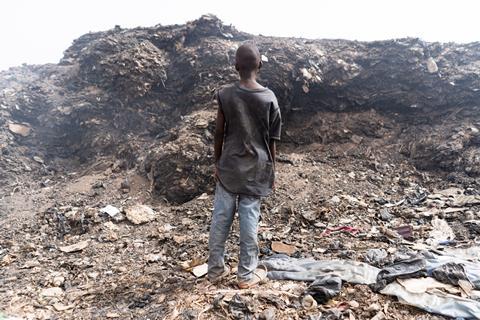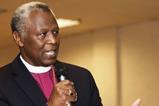After decades of progress in the fight against extreme poverty, experts are now warning the United Nations will miss its goal of ending poverty by 2030. Tim Wyatt speaks to practitioners and theologians to find out what’s going wrong, and what Jesus meant when he said, “the poor you will always have with you.”

In 2015 the great and the good gathered at a UN summit to agree a set of 17 Sustainable Development Goals (SDGs). Number one of these was simple: “End poverty in all its forms everywhere”.
More specifically, the UN set a target: by 2030 nobody should be living on less than $1.25 a day, the global benchmark for extreme poverty.
This may sound impossibly ambitious, but in fact most of the work had already been done. In 1820, as the Industrial Revolution was getting going, three quarters of the world lived below an equivalent poverty line. By the early 1990s this had dwindled to about 35 per cent of the population. And the rate of decline then sped up significantly – by 2015 when the SDGs were agreed, just 11 per cent of people were surviving on $1.25 a day or less.
The UN had comfortably met its Millennium Development Goal of halving extreme poverty, beating its target by five years. The next goal was to finish the job and lift everyone above the $1.25 a day line by 2030. But, sadly, it is not going to happen. The rapid falls in extreme poverty seen over the last 30 years have ground to a halt. In fact, we are going backwards – since 2019, 70 million more people are living in extreme poverty.
“It’s really impossible to look at the picture for global poverty rates over the last, say, half a century or so and say that it’s getting worse over the long-term,” said Mark Preston from Compassion UK. “But we’ve definitely seen a bump in the road post-pandemic.”
What’s gone wrong?
When speaking to those working in aid and development, one thing comes up time after time: covid.
Noirine Khaitsa, a senior manager for Compassion International working in Uganda said it was impossible to underestimate the impact of the pandemic.
“Before covid, we were making good steady progress, and then it set us back,” she said. In Uganda and across much of the developing world, Khaitsa said the economy was still in tatters, with many having lost their jobs in tourism, hospitality or the informal economy during the lockdowns. While schools were closed many children dropped out of education entirely, were married off by their parents, and girls fell pregnant. Some adults are permanently unable to work after catching the virus, again dragging children out of school to care for them and earn a living. On top of the economic and educational damage done, covid also simply hit low-income countries harder.
we in the Global North are selfish. That’s the root of this issue
Elizabeth Myendo, who leads Tearfund’s work in Southern and Eastern Africa, noted: “For every life lost in a high income country, four people in lower income countries died.” This had the cumulative effect of setting back the development of poorer countries some eight or nine years, she estimated.
Preston added many poorer nations had seen rampant inflation in the order of 50 per cent or more, far outstripping the 10 per cent inflation seen at its worst in the West, after the pandemic. Some countries, such as Ghana or Sri Lanka, had to take out loans from the International Monetary Fund because the pandemic had emptied state coffers, but these came with stringent conditions which enforced spending cuts.
Another factor which has hampered anti-poverty work in recent years is the climate crisis. Justin Thacker, a theologian at St Hild College, and author of Global Poverty: A Theological Guide, said the impact of temperature rises were felt disproportionately in the developing world, even though most of the carbon emissions came from richer countries. His contacts in the Global South said governments there had zero faith in the West to properly address climate change, and were therefore forced to plan as though unprecedented droughts, storms, floods and heatwaves would continue indefinitely.
Another factor in the turnaround on poverty reduction can be traced back to a global food crisis, Preston explained. Already underway due to a complex mixture of conflict and climate change, since 2022 the food crisis has got much worse. Both Ukraine and Russia are among the world’s largest exporters of wheat, but the war had prevented millions of tons from reaching its destination.
The spiritual dimension
But some suggest the problems around anti-poverty work are not about war in Ukraine, a novel coronavirus or carbon emissions – they are about sin and spirituality.
Thacker said the climate crisis was fundamentally down to sin. “It’s because we in the Global North are selfish. That’s the root of this issue - it’s the selfishness of how we live and how we behave.”
Chris Shannahan, a Methodist minister and theologian at the University of Birmingham, said his own research – which focused on church efforts to combat UK poverty during the austerity era – showed that even in a relatively wealthy country like Britain, poverty was on the up and mostly the result of deliberate government decisions to cut benefits and not address inequality.
Neither of the theologians said they therefore believed the spiritual nature of poverty should lead us to abandon efforts to reduce or eliminate it. But other Christians have.
‘The poor you will always have with you’
Why should the church concern itself with whether there are more or fewer poor people, when it’s primary task is to save souls? Proponents of this view very often point to Jesus’s infamous words after his disciples object to him being anointed by extravagantly expensive perfume: “The poor you will always have with you.”
But was Jesus suggesting we should abandon attempts to eliminate poverty? Compassion International’s Khaitsa had no time for this argument: just because the poor will always be among us does not mean God wants us to “leave them poor”, she retorted. “I believe that we can’t eradicate poverty on our own. We don’t have the power to be able to do that. But I think God does. And God works through people. So be the vessel that God is using to eradicate the poverty.”
Myendo had a similar interpretation of the contested scripture. “At Tearfund we have a saying that ‘Poverty is not God’s plan’,” she said. Jesus’s words were a reminder to his disciples to never stop being generous to the poor so they could live life in all its fullness, as Christ also promised. “We need to look at poverty as an invitation that draws us closer to those who have less, and practice the hospitality and the generosity that Jesus was calling his disciples to practice,” she said.
We can’t eradicate poverty. But God can. And God works through people
This argument was also endorsed by Shannahan, who said when the gospels were read in context it was impossible to believe Jesus supported a “quietist, stoical or fatalistic” approach to poverty. Indeed, in his own inaugural sermon he described his ministry as “good news to the poor”, and warned in the parable of the sheep and goats that those who failed to serve the poor also betrayed him. Perhaps it was a hint at the endemic, structural nature of poverty – something that was not going away of its own volition any time soon and which therefore required ongoing work by the Church, he said. Thacker agreed, suggesting Jesus was alluding to Deuteronomy 15, where God tells the Israelites there would not be any poor among them if they kept his commands. Jesus was stating a reality, not an aspiration, Thacker argued: “We don’t redistribute wealth as God commands, so there will be poverty. But it is because we are disobedient, sinful.”
Can it be done?
In a recent Compassion survey, Christians were more optimistic about the possibility of ending extreme poverty (59 per cent) than the general population (49 per cent). The charity hailed this as an encouragement to keep going, even though the global statistics might be going in the wrong direction and the UN’s 2030 goal will be missed.
“As long as we don’t take our eye off the ball, this is not the time to give up hope and optimism,” said Preston. It might be that governmental failures during the pandemic have loosened people’s trust in central authority’s ability to fix things, but Compassion’s “secret sauce” was a network of 9,000 local churches, he said. It was not for either him in his Hampshire office nor a UN bureaucrat in New York to tell a poor person in Kigali or El Salvador “what the answer for poverty relief in their communities is”, after all. “We need to get smaller for the big problem to get smaller,” he said. Narrow down on what can be achieved, even if it is small-scale, and focus on that, he urged Christians.
His colleague Khaitsa in Uganda echoed a plea for believers not to give up hope in eliminating poverty. “I don’t need to be convinced about this working because I have myself as an example,” she laughed, noting she was sponsored through Compassion while growing up as one of eight raised by a single mother. Compassion’s anti-poverty programme had taken her from a daily struggle for food through school, university, and now into a managerial role at Compassion itself, where she not only provided for her extended family but also earned enough to sponsor other poor children. Tackling poverty among children rippled out through their families and wider communities, and brought in educational and health benefits too, she argued. In the face of this, discouragement from global statistics had to be put aside, she said. Yes, the programmes were more difficult today than five years ago before covid and food shocks, but they were still making a difference, one child at a time.
But would shifting our gaze from global setbacks to grassroots successes actually help? Shannahan said in doing so there was a danger in losing sight of the structural sins at the top of society which perpetuated local poverty. Quoting the German theologian Dietrich Bonhoeffer, he asked if the church’s job was simply to “bandage the wounds of victims beneath the wheels of injustice” or to “drive a spoke into the wheel itself”. Myendo argued both the local and the global went hand-in-hand; Tearfund aimed for bottom-up development to trickle upwards and drive the commitments and policies agreed internationally.
As for Thacker, he was sceptical of high-profile targets about the eradication of poverty, which mostly existed to make Western countries feel they were doing something but did not make much difference on the ground. “It seems to me that the improvements that we’ve seen in health and literacy and economic development would probably have occurred whether or not we had those goals.” Poverty will probably always exist, he concluded. But his response to that was not to say we should do nothing about it, but instead redouble efforts to reduce it as much as possible.
In truth, much of the eye-catching falls in severe poverty in the 1990s and 2000s were caused by China’s economic revival lifting hundreds of millions of subsistence farmers into its prosperous middle classes, Preston admitted. And China paid no heed whatsoever to the UN’s targets in so doing. Ultimately, he said the anti-poverty charities must be careful to not allow “poverty statistics to become a distraction from helping to improve the plight of people in poverty”. “One could be depressed or optimistic depending on what the data says. I feel like we’ve got a job to do. And that’s where our focus is.”
Premier’s Missions Week takes place from 7-15 October. Visit missionsweek.org.uk to read stories of hope and find out how you can give or go





































1 Reader's comment